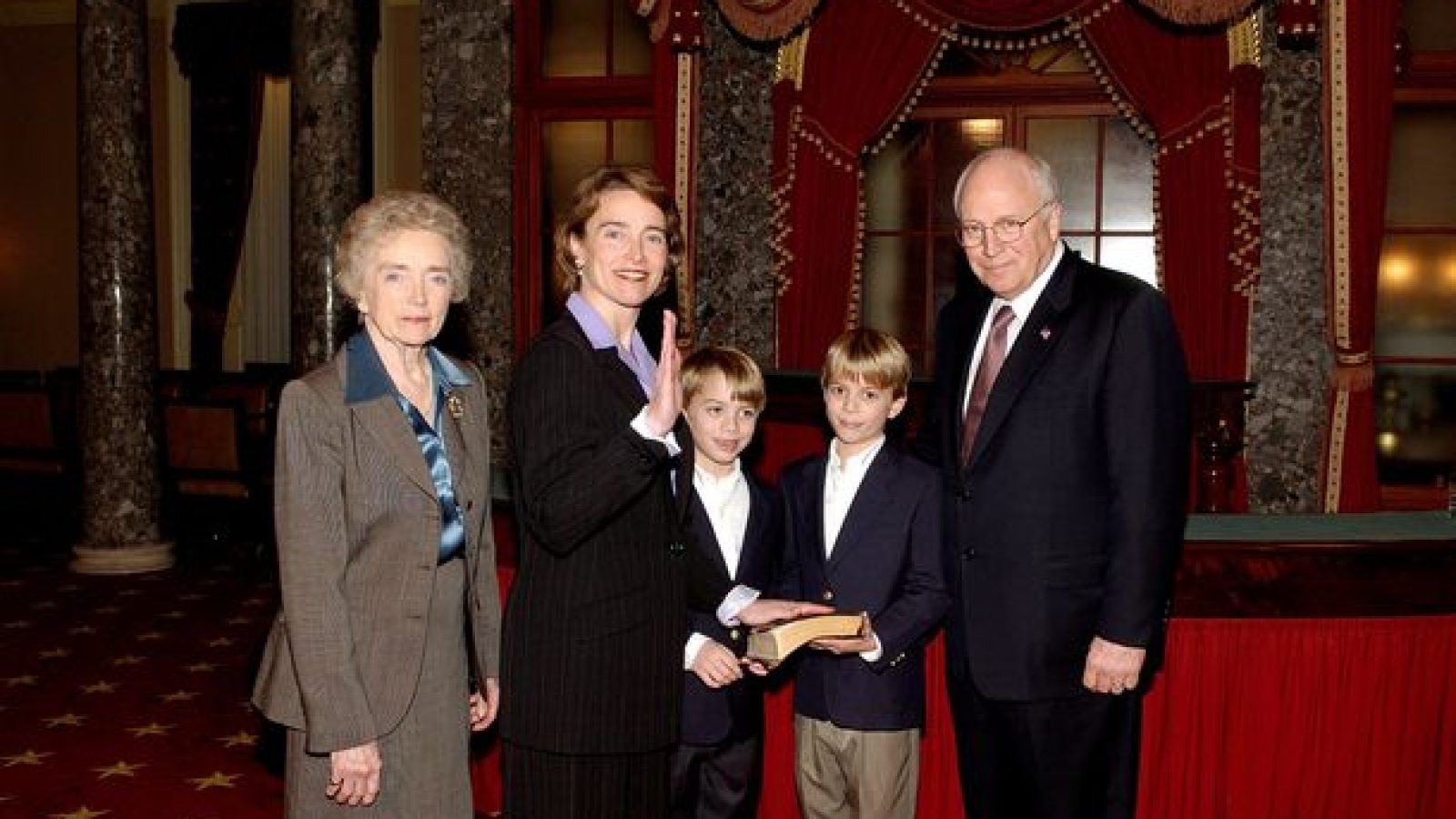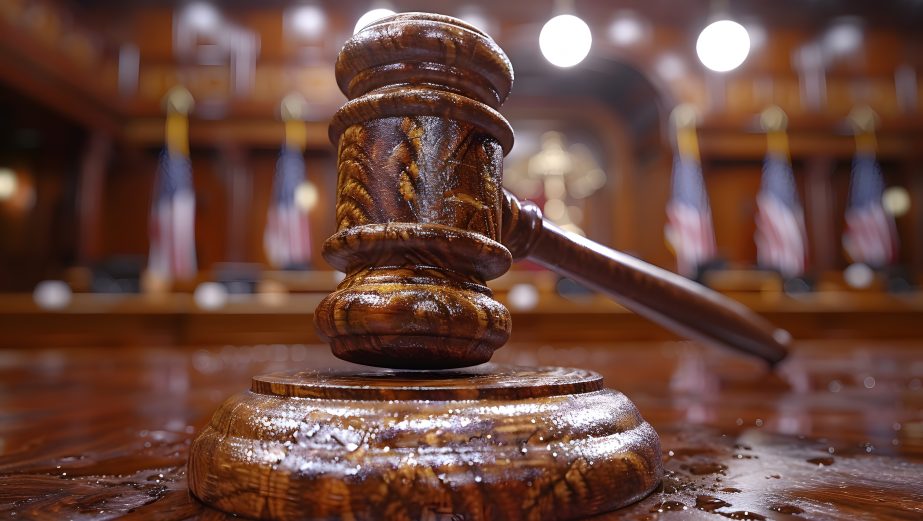Former Sen. Blanche Lincoln’s 2010 comment arguing sports event contracts are gambling and should be banned is actually evidence that Congress meant to create a framework that would allow those contracts to be permitted, according to a group of former members of Congress including Lincoln herself.
The argument came as part of an amicus brief in support of prediction exchange Kalshi on Thursday in the Third Circuit Court of Appeals. It was filed by three former senators — Max Baucus, Lincoln (second from left in above photo), and Saxby Chambliss — as well as four former members of the House — K. Michael Conaway, Collin Peterson, Cheri Bustos, and Cindy Axne.
The state of New Jersey — supported by 34 states and more than 65 tribal entities — is appealing a preliminary injunction that prevents the state from enforcing a cease-and-desist against Kalshi’s sports event contracts.
The group of ex-federal legislators describes itself as “a bipartisan group of former members of Congress who are familiar with the statutory provisions governing the jurisdiction of the Commodity Futures Trading Commission.”
Lincoln helped write ‘special rule’
The brief notes that former Sen. Lincoln’s views may be of particular interest due to her role in writing the “special rule” within the Commodity Exchange Act, which concerns event contracts related to terrorism, war, assassination, or gaming:
(C)Special rule for review and approval of event contracts and swaps contracts
(i)Event contracts
In connection with the listing of agreements, contracts, transactions, or swaps in excluded commodities that are based upon the occurrence, extent of an occurrence, or contingency (other than a change in the price, rate, value, or levels of a commodity described in section 1a(2)(i) [2] of this title), by a designated contract market or swap execution facility, the Commission may determine that such agreements, contracts, or transactions are contrary to the public interest if the agreements, contracts, or transactions involve—
(I)activity that is unlawful under any Federal or State law;
(II)terrorism;
(III)assassination;
(IV)war;
(V)gaming; or
(VI)other similar activity determined by the Commission, by rule or regulation, to be contrary to the public interest.
Since leaving the upper chamber, Lincoln has become a lobbyist, with Kalshi among her clients in 2024.
“Former Senator Lincoln and her company, the Lincoln Policy Group, have had consulting arrangements with plaintiff-appellee Kalshi for several years,” the filing said. “Kalshi pays Senator Lincoln’s company a retainer, but it has not contributed any money that was intended to fund the preparation or submission of this brief.
“Because Senator Lincoln was one of the principal architects of a key statutory provision at issue in this appeal, and the defendants-appellants cite her floor statements in support of their position, Senator Lincoln believes her views may be particularly relevant and helpful for the Court.”
‘Used solely for gambling’
On the Senate floor in 2010, Sen. Lincoln answered questions from Sen. Dianne Feinstein about the purpose of the special rule.
Most notably, she specifically brought up the idea of sports event contracts as something that “should” be banned.
“The commission needs the power to, and should, prevent derivatives contracts that are contrary to the public interest because they exist predominantly to enable gambling through supposed ‘event contracts,’” Lincoln said.
“It would be quite easy to construct an `event contract’ around sporting events such as the Super Bowl, the Kentucky Derby, and Masters Golf Tournament.
“These types of contracts would not serve any real commercial purpose. Rather, they would be used solely for gambling.”
She also went on to clarify that an event could be contrary to the public interest even if it has a legitimate economic impact.
Usually — as the brief notes — these comments have been invoked to argue that Congress intended to make sports event contracts illegal when it wrote the “special rule,” and that Kalshi’s markets should be banned. The comment was quoted by tribes suing Kalshi in California, as well as in support of an attempt to block Kalshi from offering sports event contracts in Maryland.
The former lawmakers’ amicus brief doesn’t shy away from Lincoln’s 2010 comments.
Instead, it uses the quote in almost the exact opposite way to how it’s been referenced in the past. The ex-lawmakers argue the comment is actually proof that sports event futures are not illegal gambling.
The brief argues that the 2010 exchange is “revealing” because Lincoln mentions the Commodity Futures Trading Commission (CFTC) as the body that would prevent gaming-related event contracts from being offered. This, it says, shows that Congress intended for federal law to supersede state gaming laws when it came to contracts offered on CFTC-registered exchanges, and gives the CFTC sole discretion to determine if a gaming-related contract is against the public interest and ban it.
“Senator Lincoln’s colloquy with Senator Feinstein confirms beyond doubt that the special rule reaches trading on designated markets, even if that trading resembles gambling,” the brief says.
The CFTC has thus far taken no action against Kalshi’s sports event contracts, and Brian Quintenz, President Donald Trump’s nominee to lead the regulator and a current Kalshi director, is expected if confirmed to continue to allow the contracts to be offered. If the commodities regulator has sole power to determine whether sports event contracts should be banned, they are likely to remain legal and widely available at least through the current presidential administration.
Paradigm and Bitnomial file amicus briefs
Alongside the former legislators’ brief, two other organizations contributed amicus briefs in support of Kalshi. Venture capital fund Paradigm — which led Kalshi’s fundraise last month — argued in support of Kalshi with a focus on the history of commodities regulation.
Paradigm claimed that New Jersey’s arguments “just rehash arguments Congress first rejected over a century ago when it concluded that national financial markets require a set of uniform national rules.”
It argues that Congress intended for federal commodities rules to supersede state gambling laws, as states often attempted to use their gambling laws to ban certain forms of commodity futures trading before the CFTC was set up to provide a federal regulatory framework.
“When farmers traded the first futures contracts on Chicago exchanges in the 19th century, the states called that gambling, too,” Paradigm said.
The third amicus brief came from cryptocurrency, futures, and event contracts exchange Bitnomial. Bitnomial is registered as a Designated Contract Market (DCM) with the CFTC, but does not currently offer sports event contracts.
However, it argues that New Jersey’s claims would have implications beyond the world of sports contracts.
“The breadth of potential state interference extends far beyond sports event Contracts,” Bitnomial says. “Many states define gambling broadly enough to encompass any financial position on an uncertain outcome, potentially allowing regulation of all derivatives trading.”





